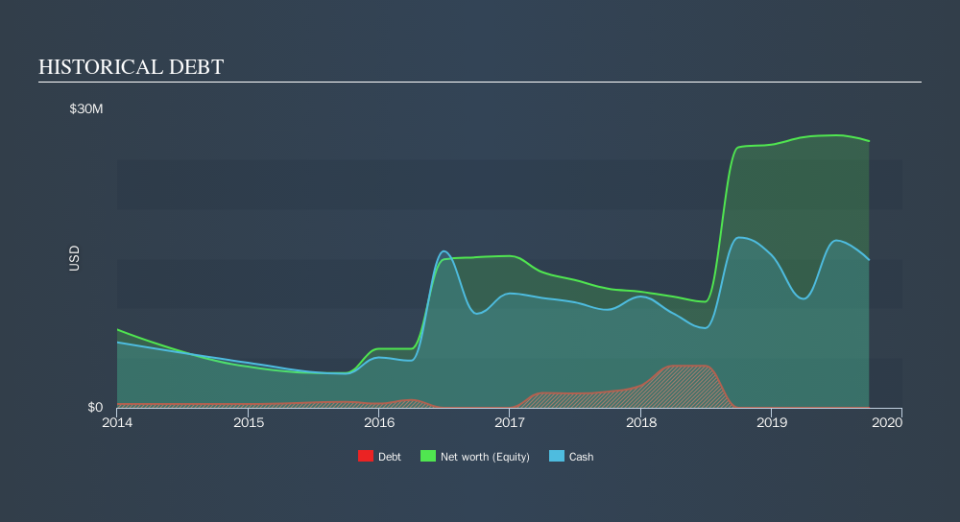Here's Why We're Not At All Concerned With Sensus Healthcare's (NASDAQ:SRTS) Cash Burn Situation

Even when a business is losing money, it's possible for shareholders to make money if they buy a good business at the right price. For example, biotech and mining exploration companies often lose money for years before finding success with a new treatment or mineral discovery. But while history lauds those rare successes, those that fail are often forgotten; who remembers Pets.com?
So should Sensus Healthcare (NASDAQ:SRTS) shareholders be worried about its cash burn? For the purposes of this article, cash burn is the annual rate at which an unprofitable company spends cash to fund its growth; its negative free cash flow. Let's start with an examination of the business's cash, relative to its cash burn.
See our latest analysis for Sensus Healthcare
Does Sensus Healthcare Have A Long Cash Runway?
A company's cash runway is the amount of time it would take to burn through its cash reserves at its current cash burn rate. In September 2019, Sensus Healthcare had US$15m in cash, and was debt-free. Importantly, its cash burn was US$5.4m over the trailing twelve months. So it had a cash runway of about 2.7 years from September 2019. Notably, however, analysts think that Sensus Healthcare will break even (at a free cash flow level) before then. If that happens, then the length of its cash runway, today, would become a moot point. You can see how its cash balance has changed over time in the image below.
How Well Is Sensus Healthcare Growing?
We reckon the fact that Sensus Healthcare managed to shrink its cash burn by 21% over the last year is rather encouraging. And operating revenue was up by 8.1%, too. On balance, we'd say the company is improving over time. Clearly, however, the crucial factor is whether the company will grow its business going forward. So you might want to take a peek at how much the company is expected to grow in the next few years.
How Easily Can Sensus Healthcare Raise Cash?
We are certainly impressed with the progress Sensus Healthcare has made over the last year, but it is also worth considering how costly it would be if it wanted to raise more cash to fund faster growth. Generally speaking, a listed business can raise new cash through issuing shares or taking on debt. Many companies end up issuing new shares to fund future growth. By comparing a company's annual cash burn to its total market capitalisation, we can estimate roughly how many shares it would have to issue in order to run the company for another year (at the same burn rate).
Sensus Healthcare's cash burn of US$5.4m is about 8.7% of its US$62m market capitalisation. That's a low proportion, so we figure the company would be able to raise more cash to fund growth, with a little dilution, or even to simply borrow some money.
So, Should We Worry About Sensus Healthcare's Cash Burn?
It may already be apparent to you that we're relatively comfortable with the way Sensus Healthcare is burning through its cash. For example, we think its cash runway suggests that the company is on a good path. On this analysis its revenue growth was its weakest feature, but we are not concerned about it. There's no doubt that shareholders can take a lot of heart from the fact that analysts are forecasting it will reach breakeven before too long. Taking all the factors in this report into account, we're not at all worried about its cash burn, as the business appears well capitalized to spend as needs be. We think it's very important to consider the cash burn for loss making companies, but other considerations such as the amount the CEO is paid can also enhance your understanding of the business. You can click here to see what Sensus Healthcare's CEO gets paid each year.
Of course, you might find a fantastic investment by looking elsewhere. So take a peek at this free list of interesting companies, and this list of stocks growth stocks (according to analyst forecasts)
We aim to bring you long-term focused research analysis driven by fundamental data. Note that our analysis may not factor in the latest price-sensitive company announcements or qualitative material.
If you spot an error that warrants correction, please contact the editor at editorial-team@simplywallst.com. This article by Simply Wall St is general in nature. It does not constitute a recommendation to buy or sell any stock, and does not take account of your objectives, or your financial situation. Simply Wall St has no position in the stocks mentioned. Thank you for reading.

